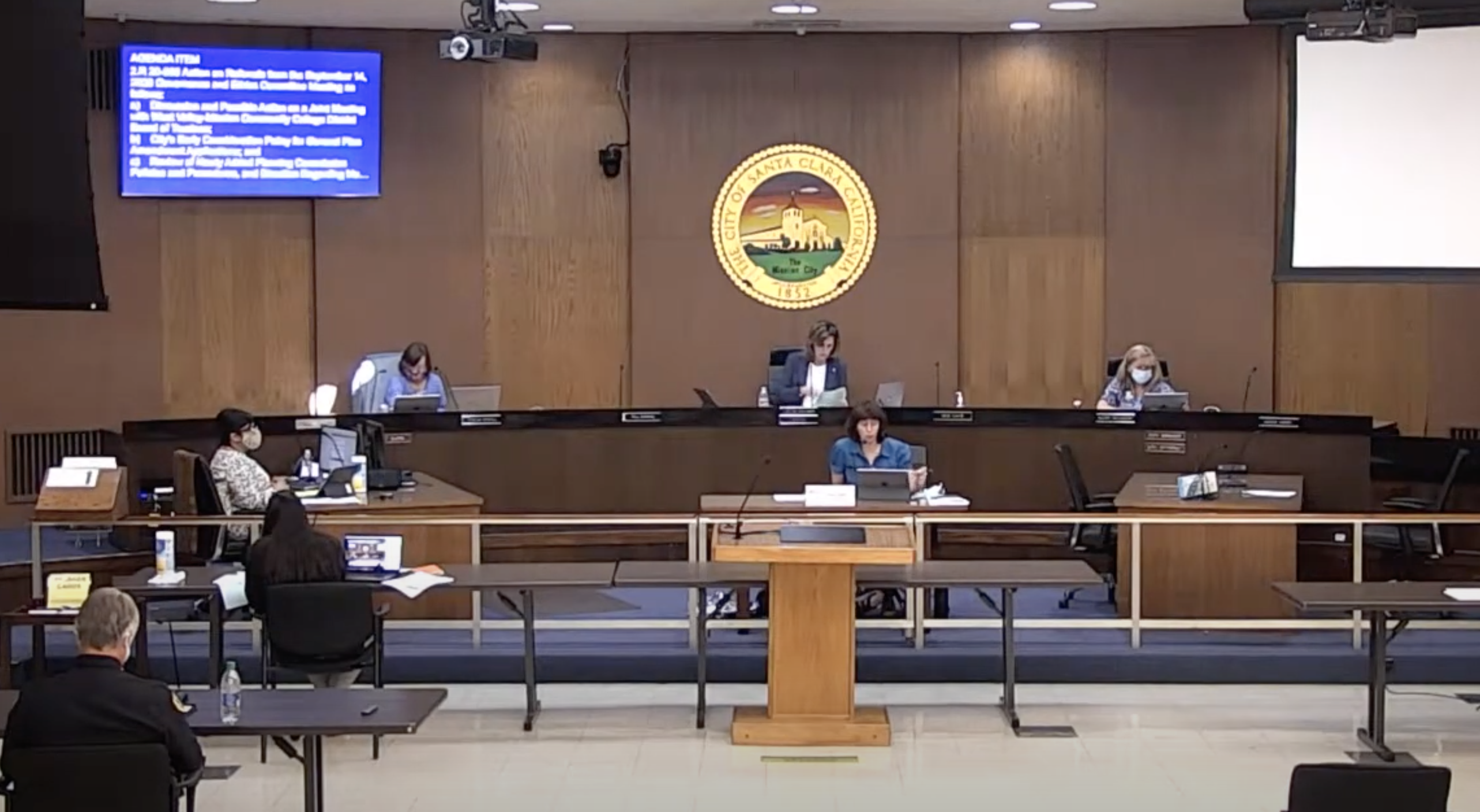

It’s probably safe to say that Santa Clara City Council has never found it so urgently necessary to inform voters about City litigation that it created a webpage devoted to a selective group of lawsuits and put an insert about them in the utility bill.
But this year, exactly one month before an election where Mayor Lisa Gillmor’s four-vote Council majority is facing a major challenge from outsider candidates, the Council approved an all-out effort to send voters a 49ers litigation report.
The Council isn’t including information on other litigation, such as the City’s now two-year-old appeal of the voting rights lawsuit it lost.
The Council move comes less than a week after the formation of the Citizens for Efficient Government and Full Voting Rights PAC headed by former Congressman Mike Honda, former Santa Clara Mayor Pat Mahan, and retired SCPD Chief Mike Sellers and funded by 49ers owner Jed York.
The PAC’s objective is supporting diversity on the City Council and opposing City Hall efforts to overturn single-member Council districts.
Since launching her “rot and stink” campaign in 2016, Gillmor has used the NFL team as her “bloody shirt,” painting them as crooks and enemies of the City, and her political opponents as 49er dupes — included among them were Pat Mahan and Mike Sellers.
While the City’s official line is that it’s providing information to residents, the Council discussion Tuesday night made its political motive clear.
“It seems that every time there’s an election year,” said Councilmember Debi Davis, “all of a sudden everything comes out the wrong way prior to an election year.”
City Attorney Brian Doyle compiled the report at the request of the Council.
“The reason I’m bringing this forward is that the [Stadium Authority/City Council] board has requested [it] because there’s so much…misinformation running around in the public about what’s going on between the 49ers and the Stadium Authority,” said Doyle.
Davis proposed the pre-election mailer in the utility bill.
“It’s to the point that because of so much misinformation out there at this time,” said Davis.
“City Manager, Executive Director, is it possible that we send out a litigation report from the City Attorney to the residents like part of the electric bill or whatever so that they do get the factual information and not the misrepresentation that is out there?”
City Manager/Stadium Authority Executive Director Deanna Santana told Davis that there was money for the direct mail campaign.
“I can tell you that, based on our last [City] Economic Development, Communications and Marketing committee meeting,” Santana said, “I believe that we shared that for the citywide mailing. it’s roughly around $10,000 so, that would be the estimated cost.”
Presumably, the $10,000 would come out of the Stadium Authority budget because any general fund spending on the stadium would violate Measure J.
Councilmember Karen Hardy pointed out that it takes two months to put something in the utility bill, and that there was no way this would reach residents before the election, as the majority wanted.
“I’m fine with people getting information about these lawsuits,” Hardy told The Weekly. But, “it was apparent to me that they were trying to use City resources to sway an election. But I also knew that it was logistically impossible.”
“I think we should do all those things — website, electric bills, direct mail,” said Gillmor who spoke several times at the meeting about ‘false information.’ “We’ve never done anything like this before. It’s important we get this information out.”
Public Agency Campaigning?
While it is illegal for public agencies to engage in campaign activities, there’s a fine line between campaigning for and informing voters about, say, the benefits from a bond measure.
The Fair Political Practices Commission (FPPC) guidelines define communications as campaigning at public expense if “the item sent expressly advocates or unambiguously urges a particular result in an election.”
However, the FPPC also says, “the entirety of the communication and the factual circumstances under which the communication was made must be considered in determining whether any particular communication is campaign material or activity.
“Merely labeling a communication as ‘informational’ is not determinative as to whether a communication is informational material or campaign material or activity.”
Mayor’s Majority in Peril
With four districts holding their first by-district election, Gillmor’s slate of candidates there’s a strong likelihood of Gillmor losing her current 4-2 majority (one seat is vacant).
In 2018 two candidates won in the City’s first by-district Council election — including the first ethnic minority to be elected in Santa Clara — in the face of Gillmor’s active opposition and heavy spending by the developer-funded Santa Clara police union PAC and trade union PACs.
Bay Area artist Nathan Oliveira (1928-2010) described himself as an abstract artist whose work had…
The California Highway Patrol's so-called "surge" operations in Oakland have netted nearly 400 arrests so…
James Williams wasn’t just Santa Clara’s first African American citizen and one of the first…
Can you spell deja vu? The battle over the best way to teach children how…
A new Sunnyvale rideshare shuttle will make it easier to get around the city’s Peery…
Former city council member and long-time active member of the Santa Clara community, Debi Davis, passed…
View Comments
I think this article is making a mountain out of a molehill for political purposes. It's entirely appropriate for the city to keep residents informed of the status of certain issues pertaining to the city. Sending the info as part of the utility bill makes logical and logistical sense. Probably should have been done earlier, but as far as I am concerned, timing is irrelevant. I also think the "SV Voice" is really biased because they are getting ad money from the candidates that they are speaking highly of, and doesn't appear to be getting much other ad money. "Don't bite the hand that feeds you" comes to mind.